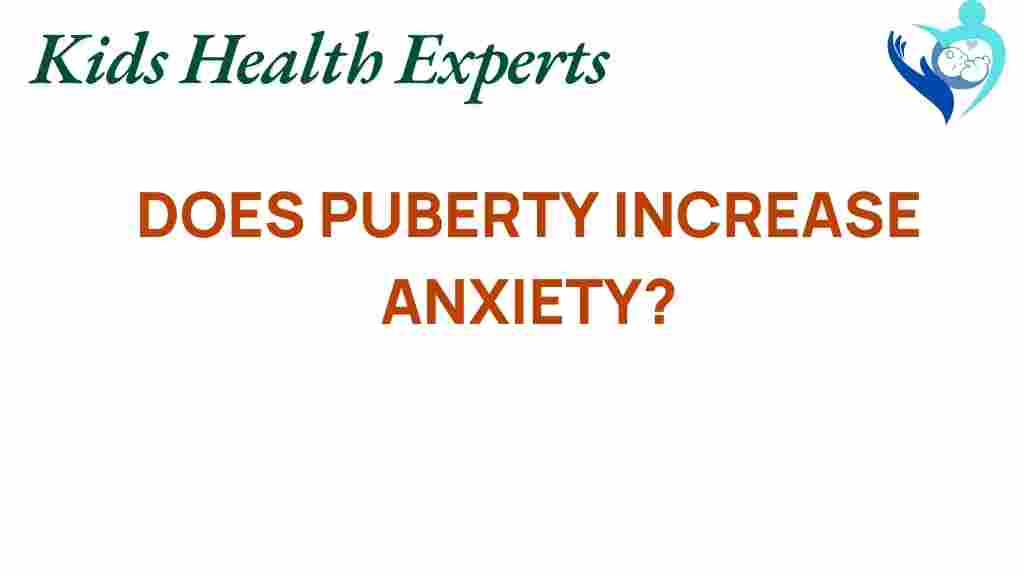Unraveling the Link Between Puberty and Anxiety: What You Need to Know
Puberty is a significant period of development in every individual’s life, marked by profound physical, emotional, and psychological changes. As adolescents transition from childhood to adulthood, they often face various challenges, including heightened anxiety. Understanding the link between puberty and anxiety can help parents, educators, and young individuals navigate this tumultuous time more effectively. This article explores the connections between puberty, anxiety, and adolescent mental health, providing insights and coping strategies to manage stress during this critical phase of development.
The Process of Puberty
Puberty generally begins between ages 9 and 14 and can last several years. During this time, individuals experience a surge in hormones, which leads to various physical changes. These changes can include:
- Development of secondary sexual characteristics (e.g., breasts in girls, facial hair in boys).
- Growth spurts and changes in body composition.
- Menstruation in females.
- Increased oil production in skin and hair.
While these changes are a natural part of development, they can also trigger stress and anxiety in adolescents. The pressure to fit in, body image concerns, and the overall uncertainty of growing up can exacerbate these feelings.
Understanding Anxiety During Adolescence
Anxiety is a common mental health issue among adolescents, with studies showing that approximately 31.9% of adolescents experience an anxiety disorder at some point. The emotional changes during puberty can contribute significantly to the onset of anxiety. Some common anxiety symptoms include:
- Excessive worrying about everyday situations.
- Physical symptoms such as increased heart rate, sweating, or trembling.
- Difficulty concentrating or making decisions.
- Feelings of restlessness or being on edge.
These symptoms can be overwhelming and may impact an adolescent’s ability to function in daily life. The combination of hormonal changes, social pressures, and the need for independence creates a perfect storm for anxiety to flourish during this developmental stage.
The Emotional Changes of Puberty
Puberty is not just a physical transformation; it is also a time of significant emotional change. Adolescents may experience:
- Increased mood swings and emotional volatility.
- Heightened sensitivity to social interactions and peer opinions.
- A quest for identity and self-acceptance.
These emotional changes are normal, but they can lead to heightened stress and anxiety. Adolescents may find themselves feeling overwhelmed by their feelings, leading to difficulties in managing their emotions and coping with stress.
Stressors Contributing to Anxiety in Adolescents
Numerous stressors can contribute to anxiety during puberty, including:
- Peer Pressure: The desire to fit in can lead to anxiety about social interactions and acceptance.
- Academic Expectations: Pressure to excel in school and prepare for future opportunities can create significant stress.
- Family Dynamics: Changes in family structures or conflicts can exacerbate feelings of anxiety.
- Body Image Issues: As bodies change, concerns about appearance and self-esteem can lead to anxiety.
Recognizing these stressors is the first step in addressing the anxiety that may arise during adolescence.
Coping Strategies for Managing Anxiety During Puberty
While anxiety can be challenging to navigate, there are several effective coping strategies that adolescents can employ:
- Open Communication: Encourage adolescents to talk about their feelings with trusted adults, friends, or counselors. Open dialogue can help them process their emotions.
- Physical Activity: Regular exercise has been shown to reduce anxiety levels. Activities like sports, dance, or simply walking can improve mood and reduce stress.
- Meditation and Mindfulness: Practicing mindfulness and relaxation techniques can help manage anxiety. Techniques such as deep breathing, yoga, or guided imagery can be beneficial.
- Healthy Lifestyle Choices: Eating a balanced diet, getting enough sleep, and avoiding excessive caffeine or sugar can positively impact mental health.
- Time Management: Teaching adolescents to manage their time effectively can reduce stress related to academic pressures.
Implementing these strategies can provide adolescents with tools to cope with anxiety as they navigate the changes of puberty.
When to Seek Professional Help
While many adolescents may experience mild anxiety during puberty, some may require professional help. Signs that it may be time to seek assistance include:
- Persistent anxiety that interferes with daily activities.
- Physical symptoms of anxiety that are severe or debilitating.
- Changes in behavior, such as withdrawal from friends or activities they once enjoyed.
- Increased substance use as a coping mechanism.
If you or someone you know is experiencing these symptoms, it is essential to consult a mental health professional. Early intervention can lead to more effective management of anxiety and support positive mental health outcomes.
Understanding the Role of Parents and Educators
Parents and educators play a critical role in supporting adolescents during this tumultuous time. Here are some ways they can help:
- Educate Themselves: Understanding the changes and challenges of puberty can help adults better support adolescents.
- Create a Supportive Environment: Providing a safe space for adolescents to express their feelings can foster open communication.
- Encourage Positive Relationships: Helping adolescents build healthy friendships can provide them with the support they need.
- Model Healthy Coping Strategies: Adults should demonstrate healthy ways to manage stress and emotions.
By being proactive and supportive, parents and educators can significantly impact adolescents’ mental health during puberty.
Conclusion
Puberty is a crucial developmental stage characterized by profound changes and challenges. The link between puberty and anxiety is significant, as increased hormonal fluctuations, emotional volatility, and social pressures can contribute to heightened anxiety levels in adolescents. Understanding these connections is essential for fostering mental health and well-being during this time. By employing coping strategies, maintaining open communication, and seeking professional help when needed, adolescents can navigate the challenges of puberty with resilience.
For more resources on how to support mental health during adolescence, consider visiting the National Institute of Mental Health website. Additionally, for tips on effective communication with teenagers, check out our guide here.
This article is in the category Mental and created by KidsHealthExperts Team
